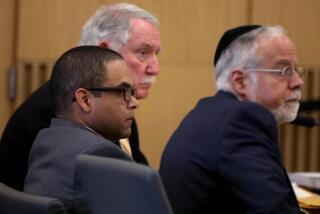Goetz Lawyer Urges Jurors to Ignore Client’s ‘Ravings’
- Share via
NEW YORK — Bernhard H. Goetz’s lawyer, delivering closing arguments Wednesday in the subway gunman’s attempted-murder trial, pleaded with jurors to disregard Goetz’s own confessions as “the ravings of a tormented man.”
Defense lawyer Barry I. Slotnick told the packed courtroom that the prosecutor’s “theories come from the most unreliable source in the whole world--the statements by Bernhard Goetz.”
Slotnick said Goetz was “traumatized, a sick, psychologically upset individual,” when he turned himself in and confessed to police in Concord, N.H., nine days after he had shot four youths in a Manhattan subway with an unlicensed pistol.
Sparked National Debate
The shootings, three days before Christmas, 1984, sparked a national debate on urban crime and the use of deadly force for self-defense.
As he has throughout the seven-week trial in state Supreme Court, Slotnick attempted to reverse the roles of assailant and victim. He said the gunman was a “frightened man” facing “a wolf pack” in the subway car.
He said Goetz was justified in shooting because “drug addicts, criminals” had surrounded him and he “believed he was about to be beaten to a pulp.”
“It is Bernhard Goetz who deserves your sympathy,” he said.
Assistant Dist. Atty. Gregory L. Waples, who will give his summation today, has argued that the 19-year-old black youths did not surround Goetz and did not carry weapons or try to rob him.
Waples has also argued that Goetz shot two in the back as they tried to run away and shot a third as he cowered in fear on a subway seat.
Videotaped Confession
Goetz did not testify. But his own four hours of statements, which the prosecutor played on videotape and audiotape to the 12 jurors, remain the most damaging evidence against him.
Jurors heard Goetz say that “my intention was to murder them, to hurt them, to make them suffer as much as possible.” He said he wanted to shoot them “again and again and again.”
Moreover, Goetz said that after shooting the youths he had walked over to one of them and shot him again on the subway bench, saying: “You look all right, here’s another.”
The youth, Darrel Cabey, remains brain damaged and paralyzed below the waist from the shooting. The other three have recovered and have been convicted of unrelated charges.
But Slotnick, fearful that Goetz’s statement was not consistent with a claim of self-defense, said Goetz had fantasized that “so-called execution.”
Stress, Fear Cited
He said Goetz’s statements about walking over and shooting Cabey were “unreliable and untrustworthy” because stress and fear had altered his perceptions and his memory.
“Up to the point where his mind turns off, it is trustworthy,” Slotnick said. “Past the moment of fear, it is not trustworthy.”
Slotnick cited witness testimony that Goetz had fired all five shots in rapid succession and had not paused.
“He was surrounded and never, ever walked over to anybody and shot them,” Slotnick said.
Slotnick tried to discredit many of the 42 witnesses in the trial. He placed blown-up portraits of the four youths behind him and used tape on the courtroom floor to pace off the subway car.
Slotnick ended by asking the jurors in a stage whisper to acquit Goetz for refusing to retreat from “predators out to beat and plunder.”
‘Did What Law Allows’
“He’s angry and he’s in pain,” Slotnick said. “But Bernhard Goetz did what the law allows.”
Goetz, 39, sat quietly with little expression, playing with a rubber band or his glasses, during his lawyer’s five-hour summation. As always, he wore an open-neck white shirt and blue jeans.
Goetz, a self-employed electronics technician, is charged with four counts of second-degree attempted murder, four counts of first-degree assault, four counts of illegal weapons possession and one count of first-degree reckless endangerment.
He faces up to 30 years in prison if convicted on the major counts.
Judge Stephen G. Crane said he hoped to instruct the jurors and give them the case for deliberations by late today.
More to Read
Sign up for Essential California
The most important California stories and recommendations in your inbox every morning.
You may occasionally receive promotional content from the Los Angeles Times.











